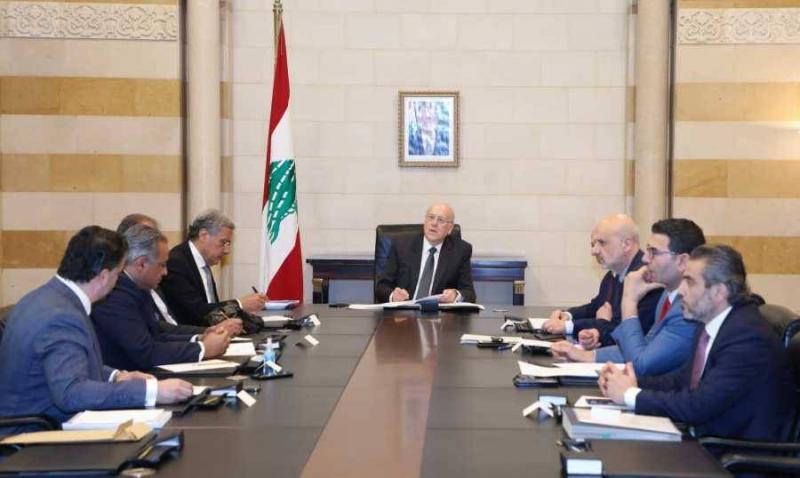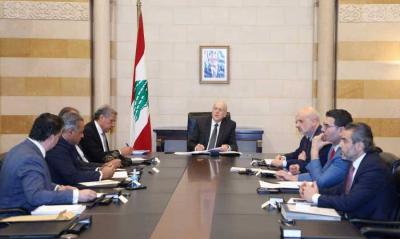The caretaker Prime Minister Najib Mikati chaired a meeting of the ministerial committee specialized in food security this afternoon at the Grand Serail, attended by National Defense Minister Major General Maurice Sleem, Economy and Trade Minister Amin Salameh, Industry Minister Georges Boujikian, Justice Minister Judge Henri Khoury, Interior and Municipalities Minister Judge Bassam Mawlawi, Culture Minister Judge Mohammed Wissam Mortada, Agriculture Minister Dr. Abbas Al-Haj Hassan, and Secretary-General of the Council of Ministers Judge Mahmoud Makiyeh.
After the meeting, Minister Salameh stated: "The ministerial food security committee held a meeting today under the chairmanship of the Prime Minister to discuss essential topics, primarily the crisis of bread and flour, as well as agricultural crops." He added: "We discussed three main points:
The first point: reviewing decision number 13 related to the support for wheat and barley cultivation and the procurement of crops. We request Lebanese farmers to work on increasing national production, and therefore, it is our duty as a state to ensure the purchase and support of this sector and to streamline it comprehensively. The food security committee agreed today in particular that the Ministries of Agriculture and Economy will establish a direct mechanism for the Lebanese state to buy quantities of wheat and crops from farmers based on the exchange rate of the dollar and in line with global prices. Payment will be made in Lebanese pounds equivalent to the dollar exchange rate, and it will certainly be aligned with global wheat prices.
The second point pertains to flour and bread; the Ministers of Defense, Interior, and Justice were present during the meeting. We were informed by the Interior Minister about some reports from the Information Division that indicated areas of breach and poor practices of embezzling public funds and using subsidized wheat for non-subsidized purposes and smuggling. We agreed to establish a crisis cell composed of the Ministries of Economy, Agriculture, and Interior to immediately start coordinating groups between ministries and security and judicial agencies to monitor the state of mills, distribution of quantities to bakeries, and combat smuggling and the black market. This will significantly control the places where smuggling and sales in the black market occur, which represent about 30% of the quantities available in the market. A decision was also made to continue and extend the allocations until a decision is made to start working with the World Bank loan."
He continued: "We are sending a message today to the mills that there are no excuses and no validity to the claim that there are no open allocations; the allocations are still open and will be extended, and therefore, wheat importation should continue without any interruption to keep the material available in the country. We clarified that there are difficulties in delivering the required wheat quantities to all countries in the region. Most importantly, strict and rigorous monitoring measures will be taken starting this week and early next week, which will have positive impacts on this crisis. We have quantities that have been discharged in the past forty-eight hours, which are sufficient to activate the market, and there are open allocations, and shipments will arrive within 15 days, and thus, we firmly reject any claims of a crisis. This crisis is fabricated and is a creation of crisis merchants, and it will be controlled and monitored securityly and judicially by the Ministry of Economy through the distribution of coupons. From now on, everything related to wheat and flour will be a priority for all agencies and will be tracked and pursued in detail starting tomorrow."
He said: "We also discussed the repercussions of the general strike on import and export movements, as the strike by public sector employees at the Port of Beirut and the airport has left about 300 containers at the port, a large part of which contains foodstuffs. We agreed in the committee that at least two employees from all ministries will attend two days a week to move the containers in the port containing food materials, because any delay in their release affects the food security in the country."
President Mikati chaired a dedicated meeting for the land transport sector, which included Finance Minister Youssef Khalil, Interior and Municipalities Minister Judge Bassam Mawlawi, Communications Minister Johnny Karam, Public Works and Transport Minister Ali Hamieh, President of the Union of Land Transport Unions Bassam Talias, and a broad union delegation.
Talias announced: "The meeting with His Excellency the President is a continuation of previous sessions held with him; the land transport sector is suffering and has reached a low point, there is no work or capabilities, and people's conditions have become difficult. His Excellency clarified that there is ground for the Minister of Transport to set a specific fare, as he does not know on which basis or price for a liter of gasoline or diesel he will rely. An agreement was made to officially start cracking down on violations and implementing the law regarding counterfeit vehicles, duplicated plates, and various applications.
He added: "The phenomenon of tuk-tuks should not be used on public roads and highways as it endangers riders, and the Interior Minister will issue a decision to control violations." He also mentioned: "We discussed starting to implement assistance for public drivers through the funding card that other families benefit from. We also requested the exemption of drivers from the mechanical fee for 2022."
He concluded by stating: "The current situation does not allow for stable transport fares; the fare should be based on a study that is not available due to the inability to stabilize the exchange rate of the dollar and the price of gasoline and diesel. We are studying the fare that can be set to ease the burden on people and drivers, and we appreciate the treasury and state context as the agreement regarding support for drivers has not been implemented for reasons related to capabilities."




